#alexander/hephaistion
Explore tagged Tumblr posts
Text
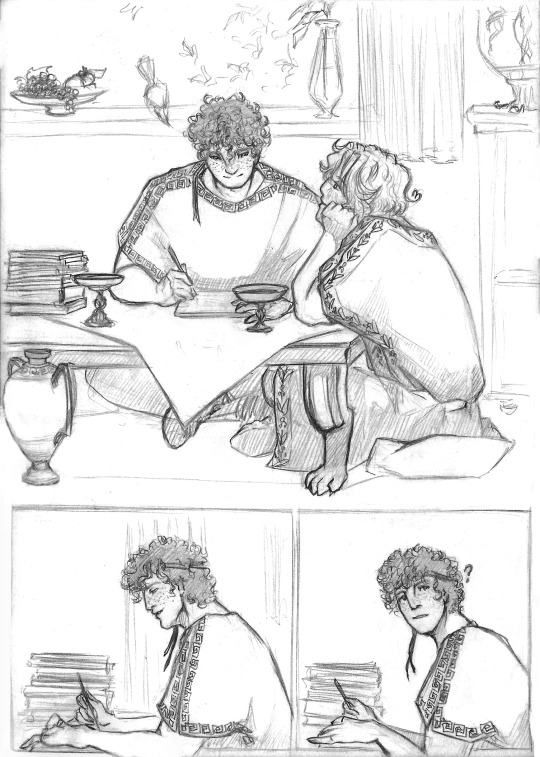

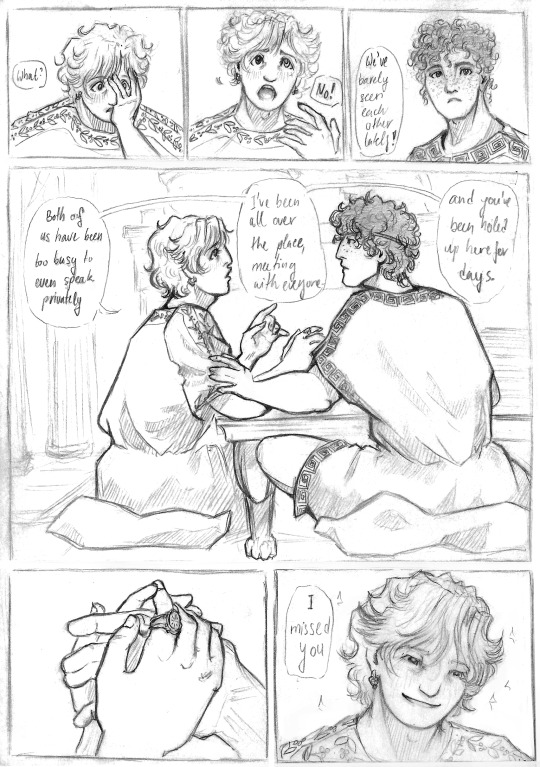

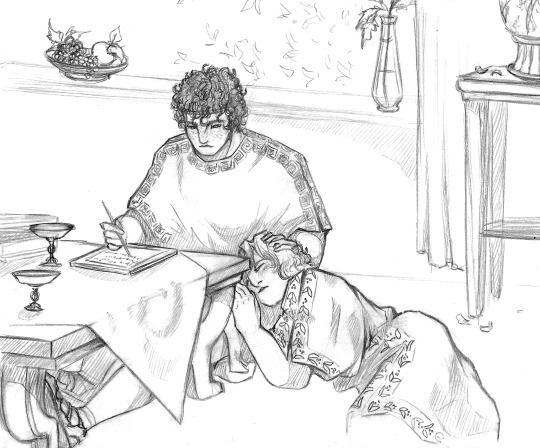
short little comic I drew in lectures
given Alexander's tendency to work a lot and sleep very little, especially earlier in his life, he likely had a tendency to doze every free moment he got (based off my own habit of falling asleep at my work table all the time) - and I wanted to draw something with it
#ert#comic#atg#alexander the great#alexander of macedon#hephaestion#hephaistion#alexander x hephaestion#alexander/hephaistion#I will draw them until we all agree on a shipname or I will die trying#ancient greece#ancient macedon#for anyone interested: I imagine this taking place sometime after Tyre. before the conquest of Egypt#this is very soft very shoujo manga-esque and that was Intentional#I also kinda went into it no thoughts head empty#so there was no thumbnailing or figuring out the layout or anything just rawdogging this whole damn thing#i intended to just scan it and drop it unceremonously#anyways I spent like 40 minutes trying to at least Slightly edit it#its been so long since i posted a comic (even longer since I posted an unedited comic)#so. yknow. enjoy#and talk to me about these two?? I guess???#dedicated to all 2 people who follow me because I post about them and the 3 people who now always think of me when they hear his name#youre welcome for that btw
214 notes
·
View notes
Text

Alexander and Hephaestion bathe their horses (2024)
#alexanderthegreat#hephaestion#hephaistion#bucephalus#horse#rider#ancientgreece#marysmirages#painting#alexander of macedon#pond#horse bathing
443 notes
·
View notes
Text

Alexander and his generals!
(at least the ones I actually remember by their name, sorry Cleitus💀)
Edit: Huge thanks to everyone who respectfully explained the topic of skintones in Ancient Macedonia to me, I truly appreciate it 🙏
#ancient greece#greek mythology#tagamemnon#ancient macedonia#alexander the great#hephaestion#hephaistion#alexander x hephaestion#ptolemy i soter#cassander#fanart#my art#artist on tumblr#i yassified them i know#dont care tho
379 notes
·
View notes
Text

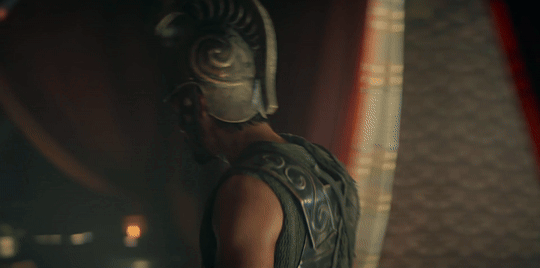



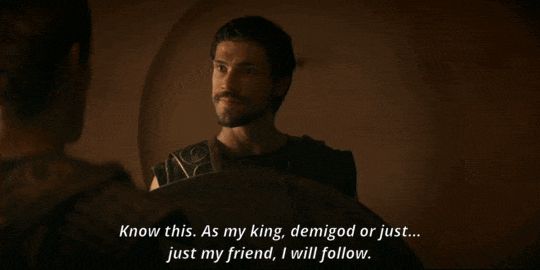




Interviewer: Are you very fond of Alexander? Gene Roddenberry: As a matter of fact, I am. I have Mary Renault's new Oxford book―in fact, I'd have everything in the bookstores a few years ago. Passionate admirer of Alexander. Passionate man. [...] Interviewer: There's a great deal of writing in the STAR TREK movement now which compares the relationship between Alexander and Hephaistion to the relationship between Kirk and Spock―focusing on the closeness of the friendship, the feeling that they would die for one another― Gene Roddenberry: Yes. There's certainly some of that with―certainly with love overtones. Deep love. The only difference being, the Greek ideal―we never suggested in the series―physical love between the two. But it's the―we certainly had the feeling the affection was sufficient for that, if that were the particular style in the 23rd Century. [He looks thoughtful] That's very interesting. I never thought of that before. [From Shatner: Where No Man (1979)]
Sooo I watched the new docuseries Alexander: The Making of a God and I was hit by indirect Kirk/Spock feelings because I remembered this interview. And of course I had to make a gifset about it. :)
#spirk#alexander x hephaestion#star trek tos#alexander: the making of a god#star trek the original series#james t. kirk#spock#k/s#kirk x spock#space husbands#alexander the making of a god#alexander the great#hephaestion#my gifs#hephaistion#alexander x hephaistion#gene roddenberry
407 notes
·
View notes
Text

Alex and his marshals
#ancient history#ancient greece#ancient macedonia#hephaestion#hephaistion#alexander the great#alexander/hephaestion#digital art#history#historical art#doodle
68 notes
·
View notes
Text
Hey bro what if we married two sisters but like as a political move, like I marry the oldest princess and you marry her younger sister so we can be officially a family, but I mean we should marry the same day with a lot of other couples but you're my right hand and I'm the king so you and I will stand next to each other and be the most important men there and get married together and have a family together because you know our children will be cousins and I want your babies to be related to me and my babies to be related to you bro, isn't it great that we can have babies together, it's just everything true bros would want, I can't wait for our wedding day, love you bro <3
#susa weddings#sorry this will always be funny#alexander x hephaestion#alexander x hephaistion#alexander the great#hephaestion#hephaistion#ancient history
331 notes
·
View notes
Text




ALEXANDER (2004) | dir. Oliver Stone
#Alexander 2004#alexander#hephaistion#colin farrell#jared leto#filmedit#moviegifs#filmgifs#movieedit
764 notes
·
View notes
Text

Well, that got through at least. :-)
And they took my advice to cast a dark-haired, Mediterranean-looking Hephaistion too.
(Edit to add, because I’ve been asked: I was the historical advisor to the series. No, they didn’t listen to everything I suggested, and I never saw costumes/sets, but they did take my advice on a few things, including the casting look for Hephaistion. And they kept the kiss.)
For more, read Dancing with the Lion. I pulled no punches there about their relationship. And he has a properly Greek nickname (as does Alexander).
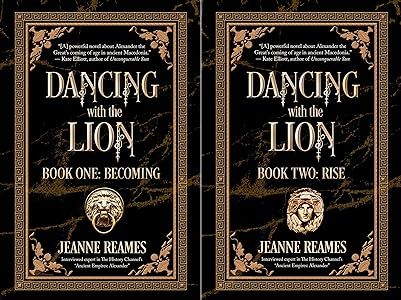
#alexander the great#alexander x hephaestion#alexander x hephaistion#hephaistion#hephaestion#dancing with the lion#dwtl#alexander: the making of a god
233 notes
·
View notes
Text

missed using my colour pencils
#sketchbook#alexander the great#hephaestion#atg#alexander/hephaistion#alexander x hephaistion#im not finishing this cause I kinda hate the anatomy in it but I like this part. so#theres a new genre of art in my sketchbook that I call 'hephaistion annoys alexander while alexander works at his desk'#ert
83 notes
·
View notes
Text
as insane of a quote as this is- does anyone know where it's from?

#alexander the great#hephaestion#hephaistion#alexander x hephaestion#he was framed EVERYWHERE as alexander's queen/co-ruler the fics are practically writing themselves
405 notes
·
View notes
Text
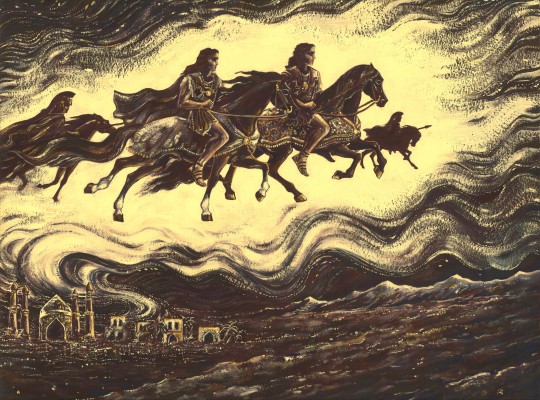
Spirits of ancient battles. Memories of Alexander the Great (2023/2024)
Gouache version of the work from 2017: https://www.tumblr.com/marysmirages/686070565494259712/spirits-of-ancient-battles-memories-of-alexander?source=share
#alexanderthegreat#hephaestion#hephaistion#alexander of macedon#marysmirages#asia#ancient greek mythology#painting#art#horse#rider#mirage#oasis#persia
501 notes
·
View notes
Text
Hephaistion: I am the most moderate, most peaceful man in this army.
Alexander: Just yesterday you threw a chair at Krateros.
Hephaistion: Which was a moderate, peaceful compromise for the table I was initially planning to throw at him.
Bagoas *holding ice to his face*: I just wish you would have hit him.
71 notes
·
View notes
Text
jason and leo parallels to the great historical lovers alexander and hephaistion. how do we feel about that 🤠
(i’ve been going through the most intense alexander the great hyperfixation this week and naturally i feel the need to correlate every single thing i’ve ever liked).
so. realistically, there wouldn’t be many, but i’ll list some facts that could be comparable between jason/alexander and leo/hephaistion:
alexander was said to be a descendant of zeus on his father’s side, he was blond and was unbelievable in battle— said to have never lost one. he was a very big admirer of heracles and he had a horse he loved dearly called bucephalas. jason of course is a son of jupiter/zeus. blondie with great combat skills. he also, to my understanding at least, looked up to heracles up until their meeting in mark of athena. and he has tempest, his storm spirit horse.
hephaistion was alexander’s most trusted general with a brilliant mind— sometimes described as an engineer. his name could be interpreted as a tribute to the god hephaestus (don’t quote me on that tho) oh and he also had dark hair. leo is a son of hephaestus, jason’s best friend (and boyfriend obviously!) incredible smart with a talent for engineering with curly dark hair.
they were both taught by aristotle when they were young along with other boys in what we would think of today as a boarding school. (so for this case, camp).
at least from the top of my head that’d be it. very basic parallels with jason and leo following the hoo canon. however since my hyperfixation isn’t going anywhere i’ll keep reading about a&h and will probably start a list if any of my personal valgrace headcanons apply
#you know how pjo ships are constantly being compared to classic literary/historical/greek couples?#well here’s my proposal#parallels was technically a prompt for yesterday but oh well#valgrace#valgrace week 2025#jason grace#leo valdez#jason x leo#heroes of olympus#percy jackon and the olympians#alexander and hephaistion#hoo#pjo
16 notes
·
View notes
Text
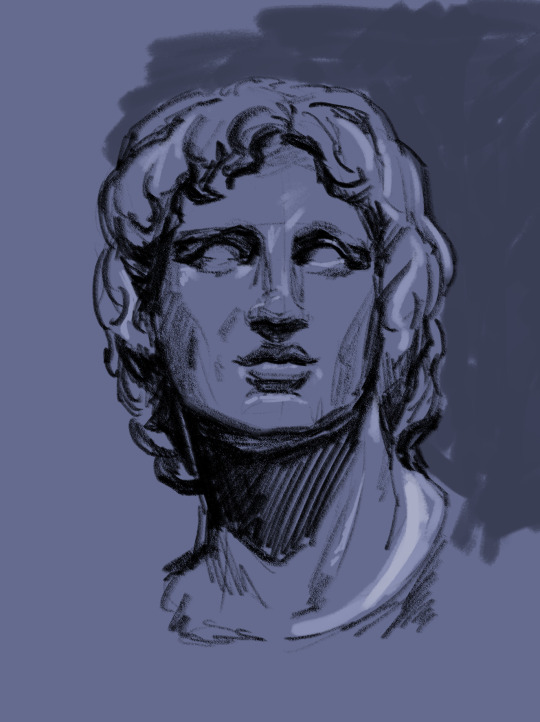
doodling al'skander when i should be sleeping because i have not recovered from the effects of the persian boy
#completely obsessed with the whole lover (hephaistion/macedon) vs beloved (bagoas/persia) dichotomy#and all the implications of that#alexander as courtesan to the macedonian army!!#anyway. started reading funeral games today so just having lots of thoughts at the moment#the persian boy#mary renault#my art#alexander the great
148 notes
·
View notes
Text

doodle
48 notes
·
View notes
Text

Found this in an old thread about Alexander and Hephaestion, and I died LOL
#alexander x hephaestion#alexander x hephaistion#alexander the great#hephaistion#hephaestion#achilles x patroclus#patrochilles#patroclus#achilles
206 notes
·
View notes